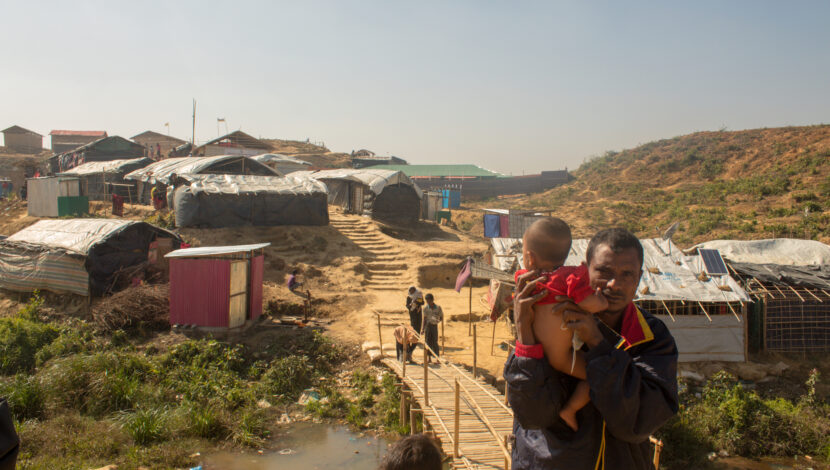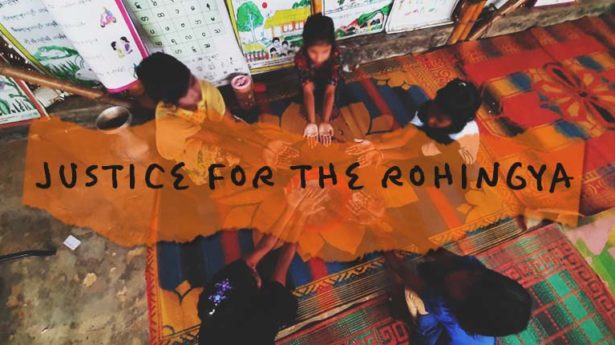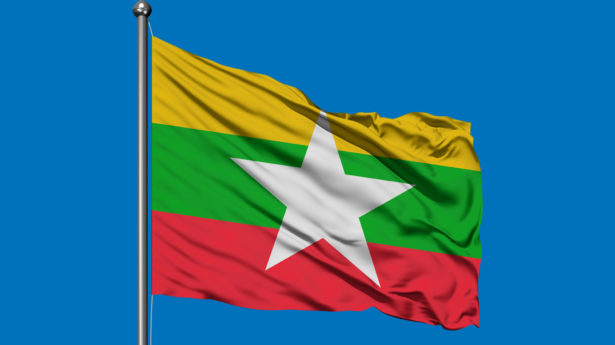The Unitarian Universalist Service Committee advances human rights through grassroots collaborations.
Five Years of Genocide, Still No Justice

By UUSC Staff on August 25, 2022
This month marks the fifth year since the Burmese military tore through parts of Rakhine state—a region in western Burma (Myanmar) where the Rohingya ethnic minority live—and ruthlessly expelled the Rohingya through a campaign of murder, rape, arson, and other forms of deliberate and premeditated violence. As a result, nearly a million Rohingya civilians were forced to flee their native country.
This mass displacement is one of the largest refugee crises in Asia today and remains fundamentally unresolved. The Rohingya people would like to go home if they could. But the regime in power in their native country is led by the same military that tried for decades to annihilate their existence.
The horrific forced removal of the ethnic group in August 2017—which the Burmese military falsely characterized as “clearance operations” in response to a terrorist attack—was the most intense episode of violence the Rohingya have experienced at the military’s hands. But it was not the first.
The roots of the genocide lie in the military regime’s decades-long quest to erase the Rohingya people’s identity. Through a series of overt and covert forms of discrimination spanning both the military’s reign and the shortlived period of civilian rule that ended in 2021, the Rohingya were stripped of their citizenship, falsely written out of Burma’s history, and disenfranchised from participating in the country’s electoral processes.
The intent of these policies was to deny the existence of Rohingya people as members of Burmese society and—ultimately—to lay the groundwork for perpetrating violence against them. It is for this reason that the U.S. Holocaust Memorial Museum—among the foremost international experts in the study of mass atrocities—has characterized these events as “Burma’s Path to Genocide.”
Just as 2017 was not the beginning of the genocidal process, it also did not mark the end. The genocide against the Rohingya is ongoing. To this day, there exists no safe and recognized method for Rohingya refugees to reclaim their former homes—at least not under conditions that would guarantee protection of their rights and equal citizenship upon their return.
Those Rohingya who remain in Rakhine state—specifically the 140,000 Rohingya living in internally-displaced person (IDP) camps set up in the wake of an earlier episode of systemic violence—live under conditions that international human rights experts characterize as apartheid. Most cannot leave these camps or move about at will; nor are they permitted to seek employment outside their villages. As a result, they are utterly deprived of basic human autonomy as well as the right to make a living. The Rohingya in the IDP camps are today almost totally dependent for their existence on international aid, and their lives are spent in what amounts to an open-air prison.
Conditions facing Rohingya refugees who fled to other countries are often not much better. While some Rohingya settled in India in the wake of the violence, a right-wing backlash on the part of militant Hindu nationalists is putting the future of Muslim refugees in India in jeopardy. And in Bangladesh—where the vast majority of Rohingya refugees arrived after the 2017 expulsion—Rohingya are forced to reside under appalling conditions in sprawling refugee camps, which they are in many cases not permitted to leave. Every way they turn, it seems the Rohingyas’ basic freedom of movement, autonomy, and dignity are being denied.
Despite the enormous challenges facing them, and the ongoing oppression they face from the regime at home, the Rohingya keep up their fight for justice. And they are making progress. The Burmese military’s bloodthirsty warfare against all the country’s ethnic groups, in the wake of the February 2021 coup, has forged new and previously-unlikely alliances in the struggle to end military rule. The Burmese government-in-exile, known as the National Unity Government (NUG), has pledged to guarantee Rohingya citizenship and rights upon the downfall of the military regime. And armed forces in Rakhine who are battling the military have taken steps to incorporate and strengthen ties between the Rohingya Muslim and Rakhine Buddhist communities that inhabit the state.
Most importantly of all, the Rohingyas’ own struggle for justice through international courts continues to move forward—albeit slowly. Rohingya leaders and activists are working through three different international mechanisms to bring the Burmese military to trial. And while these legal processes can move at a seemingly glacial pace, the International Court of Justice recently cleared one of the last procedural hurdles to moving forward with the case: offering a real if distant chance that the military might finally be called to account for its deeds.
The most important thing the international community can do to aid these efforts is to help ensure—through their own policies—that the Burmese military does not escape punishment for their crimes. After all, the 2017 atrocities against the Rohingya were not only a grave evil in themselves: they were also a warning of what was to come. Too many international powers—including the United States—failed to heed this warning and impose targeted sanctions at a time when it was still possible to prevent the military from seizing power. Now is the moment to make up for that lost opportunity.
The United States has made strides since February 2021 to hold the Burmese military to account, but more is needed to truly force the junta from power and ensure they are never again allowed to terrorize the country’s population. In particular, Congress must pass the BURMA Act to cut off the profit streams the junta uses to fund their atrocities. You can help urge the U.S. to take stronger action by contacting your member of Congress today.
Photo Credit—iStock: Mostofa Siraj Mohiuddin

